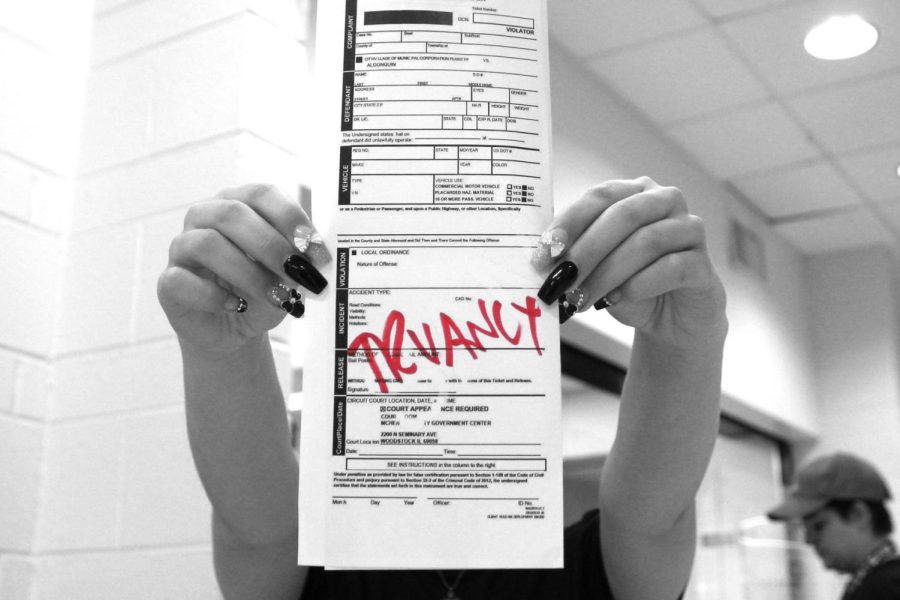The superintendent and state board
May 19, 2023
Despite a state law that says “A student may not be issued a monetary fine or fee as a disciplinary consequence,” students at MCHS continue to receive tickets from the McHenry Police Department for their behavior in school.
Last year, under Carmen Ayala’s leadership, the Illinois School Board of Education advocated against ticketing students. As state superintendent, Ayala sent schools an email imploring them to “immediately stop and consider both the cost and consequences of these fines.”
She said tickets create financial burdens and make students feel less welcome and included at school.
“ISBE continues to take a stand against punitive and exclusionary discipline, including under the leadership of [current] State Superintendent Dr. Tony Sanders,” Emily Johnson, ISBE press secretary, wrote. “Tactics such as tickets disproportionately impact students of color and increase the odds of students dropping out and experiencing involvement with the criminal justice system, which only harms families and communities.”![]() Loading ...
Loading ...
MCHS Superintendent Dr. Ryan McTague explains that tickets open additional resources for families and students. Since a ticket does not typically go on the criminal record, it serves as a way to potentially correct behavior without a permanent consequence.
“If you weren’t to write a ticket, the police actually would have the power to arrest that person because of the nature of the offense, whether it’s drugs or violence,” McTague said. “Moving through that ticketing format, hopefully, is a way to hold that student accountable and really talk with the student and family [about] the seriousness of that offense.”
ISBE knows that behaviors seen as defiance and misconduct “often stem from trauma students have experienced.” Because of this, the state board of education believes punitive practices are ineffective since they do not address the root cause of problems. McTague said ticketing is not “just about punishing you” and that counseling is available to students.
“I think we always try to work with students,” he said. “Let’s say it’s [a ticket] for using illegal substances at school. There’s definitely a referral to our coordinator and maybe an outside resource like Rosecrance [a behavior health and addiction treatment provider] to do a drug evaluation and start counseling. If there are further issues, and if kids are continually having conflicts, you might refer them to a social worker.”
Although helping students is a focus, so is maintaining a safe school environment. MCHS has “slowly changed a lot of our policies when it came to how students were referred” to SROs. “Pretty serious” offenses like disorderly conduct and unlawful possession of cannabis receive the most tickets now.
“I think you expect to go to a school that’s safe,” McTague said. “I think your parents expect to send you to a school that’s safe. If someone wants to physically assault someone else or if someone’s going to bring dangerous drugs into school, there’s definitely a school consequence. That’s also going to lead to an additional consequence with the police … in order to keep our school safe.” I think you expect to go to a school that’s safe. I think your parents expect to send you to a school that’s safe. If someone wants to physically assault someone else or if someone’s going to bring dangerous drugs into school, there’s definitely a school consequence. That’s also going to lead to an additional consequence with the police … in order to keep our school safe. — Dr. Ryan McTague, District 156 Superintendent
Since last year, a concern with tickets has been the fine that comes with them. Local ordinance violations in McHenry range from $25 to $500, not including associated hearing fees. In Ayala’s email to schools, she mentioned that a $250 fine could be groceries for the week or a hearing bill. McTague said he would like to see a “restorative approach” to ticketing rather than fines, especially for lesser offenses.
“I would like to see less fine-based types of punishment and more community service-type punishments,” he said. “More towards the restorative angle of discipline and more towards a restorative angle of accountability — restoring the dama that’s been done to the community without just charging fines.”
McTague said that is what District 156 is working to do with the police department and McHenry County.
ISBE said they understand school leaders cannot single-handedly stop ticketing — and that legislation is needed. The board supports the proposed HB3412 to end student ticketing for misbehavior.
“Even after legislation is enacted,” Johnson said, “schools will need ongoing training and professional development to enact holistic shifts in practice and start approaching discipline from a trauma-responsive lens.”
At MCHS, there are already attempts to do that, balancing the need to maintain order while helping students. McTague said kids make mistakes but that a ticket can be a “wake up call” and prevent students from ending up in jail or using illegal drugs after they leave high school.
“The toughest thing to say is, “Hey, you made a mistake,’” McTague said. “But we love you. You’re still a part of our community. We want to make sure that [those behaviors] don’t happen again and that this wasn’t a life altering mistake.”
To increase understanding of trauma-informed practices, ISBE “has invested significantly” in training and support for schools. ISBE allocated $35.25 million to the Resilience Education to Advance Community Healing initiative and Social-Emotional Learning Hubs. Both assist districts in learning about and implementing ways to address trauma and mental health needs.
